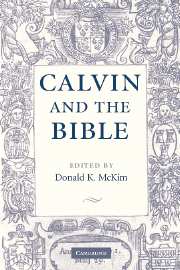Book contents
- Frontmatter
- Contents
- Notes on contributors
- Preface
- List of abbreviations
- 1 Calvin as commentator on Genesis
- 2 Calvin as commentator on the Mosaic Harmony and Joshua
- 3 Calvin as an interpreter of Job
- 4 Calvin as commentator on the Psalms
- 5 Calvin as commentator on the Prophets
- 6 Calvin as commentator on the Synoptic Gospels
- 7 Calvin as commentator on the Gospel of John
- 8 Calvin as commentator on the Acts of the Apostles
- 9 Calvin as commentator on the Pauline epistles
- 10 Calvin as commentator on Hebrews and the Catholic Epistles
- 11 John Calvin as an interpreter of the Bible
- Index
3 - Calvin as an interpreter of Job
Published online by Cambridge University Press: 09 November 2009
- Frontmatter
- Contents
- Notes on contributors
- Preface
- List of abbreviations
- 1 Calvin as commentator on Genesis
- 2 Calvin as commentator on the Mosaic Harmony and Joshua
- 3 Calvin as an interpreter of Job
- 4 Calvin as commentator on the Psalms
- 5 Calvin as commentator on the Prophets
- 6 Calvin as commentator on the Synoptic Gospels
- 7 Calvin as commentator on the Gospel of John
- 8 Calvin as commentator on the Acts of the Apostles
- 9 Calvin as commentator on the Pauline epistles
- 10 Calvin as commentator on Hebrews and the Catholic Epistles
- 11 John Calvin as an interpreter of the Bible
- Index
Summary
Calvin never wrote a commentary on the book of Job. His interpretation of this classic biblical story is found in his 159 Sermons sur le livre de Job. Because his exegesis of Job occurs only in this sermonic material, it is useful to begin with a few introductory remarks about his preaching activity.
No one needs to stress the importance of preaching for Calvin. The number of sermons alone shows how significant he believed preaching to be to his reforming mission. Rodolphe Peter has estimated that Calvin preached over 4,000 sermons in Geneva. From 1549 to 1563, his general pattern of preaching consisted of two sermons on Sunday and a sermon every day of the week in alternate weeks. The Sunday morning sermon was on a New Testament book. The sermons on Sunday afternoons were devoted also to a New Testament book or, occasionally, to a Psalm. The weekday sermons were an exposition of an Old Testament book. Calvin always preached through an entire biblical book, verse by verse, from beginning to end. The book of Job was the subject of the weekday sermons preached from February 26, 1554 to March 15 or 16, 1555. Calvin preached in French and extemporaneously. We possess these sermons because of a committee called la compagnie des étrangers. This “Immigrants' Society” of fellow exiles was dedicated to helping refugees who had fled to Geneva, chiefly, but not exclusively, from France. They employed a French refugee named Raguenier as a secretary to Calvin.
- Type
- Chapter
- Information
- Calvin and the Bible , pp. 53 - 84Publisher: Cambridge University PressPrint publication year: 2006
- 4
- Cited by

